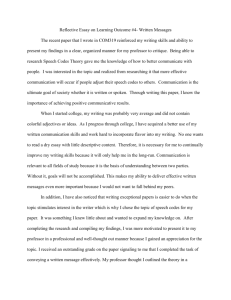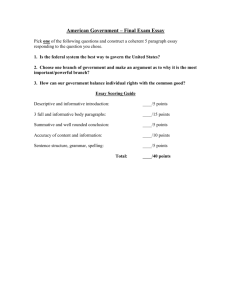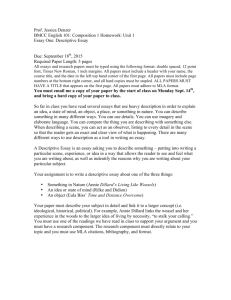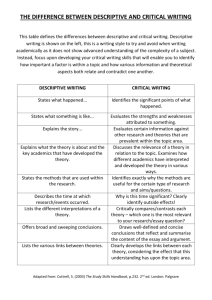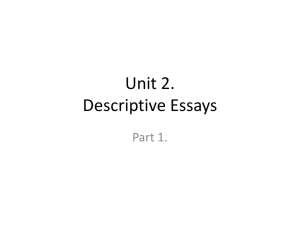Essay 1 - philosophia
advertisement
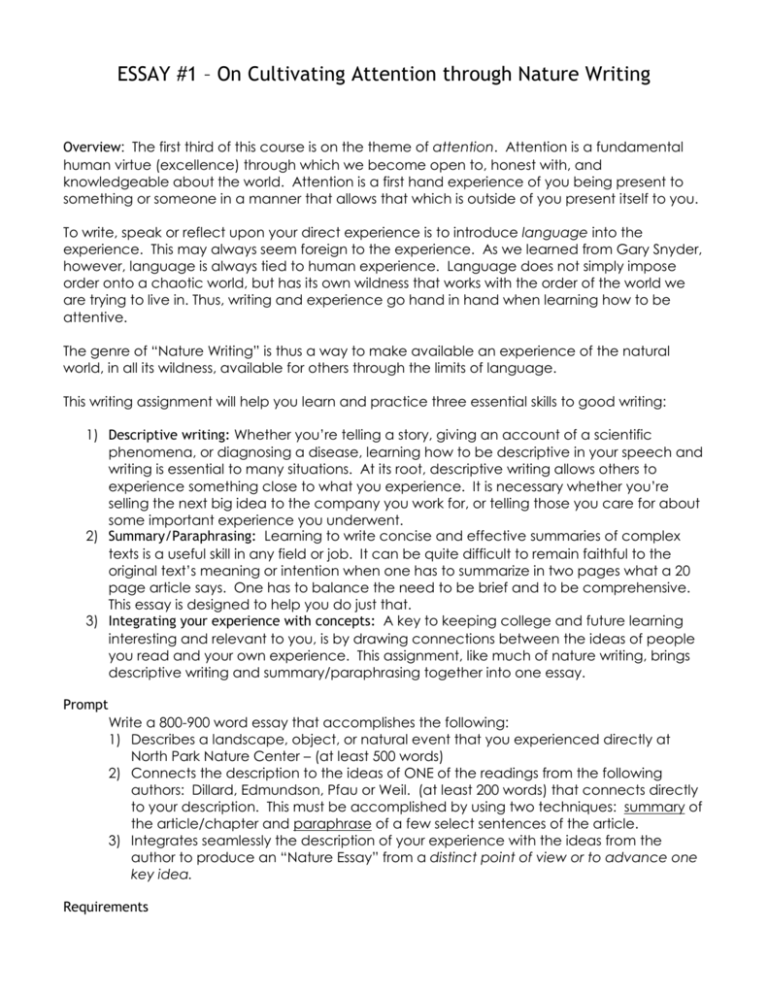
ESSAY #1 – On Cultivating Attention through Nature Writing Overview: The first third of this course is on the theme of attention. Attention is a fundamental human virtue (excellence) through which we become open to, honest with, and knowledgeable about the world. Attention is a first hand experience of you being present to something or someone in a manner that allows that which is outside of you present itself to you. To write, speak or reflect upon your direct experience is to introduce language into the experience. This may always seem foreign to the experience. As we learned from Gary Snyder, however, language is always tied to human experience. Language does not simply impose order onto a chaotic world, but has its own wildness that works with the order of the world we are trying to live in. Thus, writing and experience go hand in hand when learning how to be attentive. The genre of “Nature Writing” is thus a way to make available an experience of the natural world, in all its wildness, available for others through the limits of language. This writing assignment will help you learn and practice three essential skills to good writing: 1) Descriptive writing: Whether you’re telling a story, giving an account of a scientific phenomena, or diagnosing a disease, learning how to be descriptive in your speech and writing is essential to many situations. At its root, descriptive writing allows others to experience something close to what you experience. It is necessary whether you’re selling the next big idea to the company you work for, or telling those you care for about some important experience you underwent. 2) Summary/Paraphrasing: Learning to write concise and effective summaries of complex texts is a useful skill in any field or job. It can be quite difficult to remain faithful to the original text’s meaning or intention when one has to summarize in two pages what a 20 page article says. One has to balance the need to be brief and to be comprehensive. This essay is designed to help you do just that. 3) Integrating your experience with concepts: A key to keeping college and future learning interesting and relevant to you, is by drawing connections between the ideas of people you read and your own experience. This assignment, like much of nature writing, brings descriptive writing and summary/paraphrasing together into one essay. Prompt Write a 800-900 word essay that accomplishes the following: 1) Describes a landscape, object, or natural event that you experienced directly at North Park Nature Center – (at least 500 words) 2) Connects the description to the ideas of ONE of the readings from the following authors: Dillard, Edmundson, Pfau or Weil. (at least 200 words) that connects directly to your description. This must be accomplished by using two techniques: summary of the article/chapter and paraphrase of a few select sentences of the article. 3) Integrates seamlessly the description of your experience with the ideas from the author to produce an “Nature Essay” from a distinct point of view or to advance one key idea. Requirements The final draft of the essays must be: • Typed, double spaced, with 1 inch margins all around. • Printed and brought to class on the due date. • Include your name and date at the top. • Include a title (of your own choosing) and then includes the author’s name. • At the end of the essay, there should be a one line, properly formatted, endnote of the text that was summarized. Penalties The final grade of the paper will be reduced by half if either of the two requirements are not met. • All papers must be reviewed by a writing advisor assigned to our class. • All papers must be free of fragments, run-on sentences, and comma splices. You may use fragment if you identify them as such immediately following: E.g. “Gently, I cross the patch of maple leaves. Leaves speckled with spores. (FRAGMENT)” Due Dates September 24 October 1 Rough Draft A full 3-4 pages must be brought to class. Final Draft Printed and turned in before class via Turn-it-In. Resources Below are writing aids on descriptive writing and summaries/paraphrasing. Read through sections of Annie Dillard’s writings as good examples of the kind of writing project we are going for. She moves between highly descriptive accounts of her own experience, and summaries of the ideas and research of other authors and scientists.
